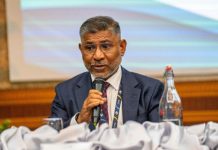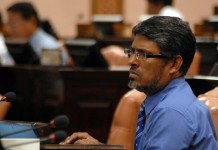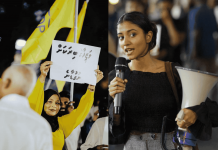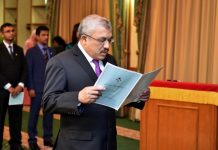The newly created Bank of Maldives spokesperson X handle in November 2025 Mohamed Saeed (@BMLSpokesperson) has made an unusual debut. Instead of addressing banking matters or public financial concerns, the spokesperson’s first major intervention has been to defend the government and dismiss mounting allegations of corruption as “baseless.”
The controversy erupted after the Muizzu administration announced the awarding of 200 projects worth MVR 2.7 billion to 53 companies linked to the ruling PNC, all without any competitive bidding process. The decision came directly on the heels of the government’s amendment to the Public Finance Rules on October 12, granting the cabinet sweeping authority to allocate projects without open bidding.
Companies With No Experience, No Capacity
Public records and business profiles raise serious questions about the selected companies. Many of them have no technical capacity, no prior experience, and no history of handling similar-scale projects. Several appear to be newly registered, shell-like entities with little more than a business license, reinforcing public suspicion that the awards were political payoffs disguised as development initiatives.
Despite this, these companies are being handed multimillion-rufiyaa projects through Bank of Maldives loans issued under government guarantees,effectively placing the financial risk on the state and ultimately the Maldivian public.
BML Becoming a Political Tool
As the details became public, prominent social media voices and financial analysts began accusing the Bank of Maldives of acting as a political instrument for the ruling party. Critics argue that BML’s funds, under the guise of government-backed loans, are being channelled to companies aligned with the PNC, potentially to launder money and inject financial muscle into the PNC’s upcoming election campaigns.
This pattern has drawn comparisons to past political financing scandals in the region, where state banks were weaponised to pump money into ruling-party networks.
BML Entering Active Political Defence
What makes this episode particularly alarming is the Bank of Maldives’ sudden willingness to publicly defend a political controversy a role far outside the mandate of a national bank. For the first time in its history, BML has stepped into the political arena, functioning almost as an extension of the ruling party’s communications machinery.
Rather than providing transparency or data to reassure the public, the spokesperson simply rejected the allegations outright, adding fuel to concerns that BML’s independence is being rapidly eroded under the Muizzu administration.
The combination of no-bid contracts, politically connected companies, government-guaranteed loans, and now an overtly politicised stance by BML signals a dangerous trend. It raises critical questions:
- Why did the government rush to amend finance rules before awarding these projects?
- How were the 53 companies selected, and on what merit?
- What safeguards exist to prevent misuse of government-backed loans?
- Why is the Bank of Maldives defending political decisions instead of maintaining institutional neutrality?
Until these questions are answered, public suspicion will only deepen.
The Muizzu administration’s insistence on opacity, paired with the Bank of Maldives’ sudden involvement in political damage control, suggests that this is not merely an issue of project allocation it is a test of institutional independence, governance integrity, and the future of public finance in the Maldives.


















